POETS' Young Scholars Program Attracts High Schoolers to Research
May 28, 2019
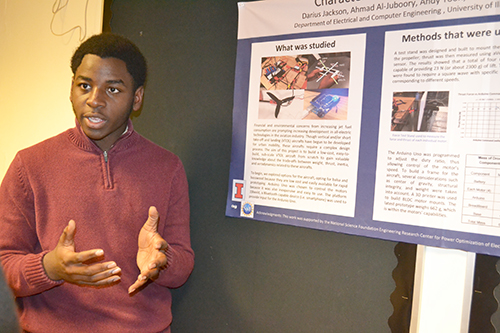
Darius Jackson presents his research to the Champaign School Board.
POETS’ Young Scholars program does just what its name implies—it gives young (high school) students the opportunity to engage in scholarly pursuits—conduct research and learn what it means to be part of a research team—just like their older counterparts. In fact, they’ve even gotten to present their research in a number of venues, including the Young Scholars’ end-of-summer poster session, at the Emerging Researchers National Conference (ERN), and most recently, to the Champaign School Board. And for three local youth who have been a part of the program, Neha Hebbar, Darius Jackson, and Kerene Kombe, this extensive exposure to academia has pretty much sealed the deal: at least two of them want to continue the research path they’ve been pursuing once they get to college, and maybe even further.
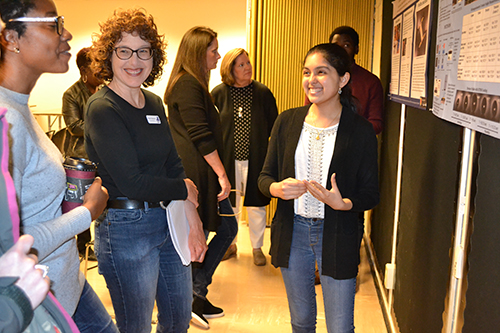
Neha Hebbar presents her research to the Champaign School Board.
The Young Scholars (YS) program was funded by the National Science Foundation (NSF) via a supplemental Research Experience and Mentoring grant that was awarded to the POETS (Power Optimization for Electro-Thermal Systems) Engineering Research Center. Through the grant, high school students were given the opportunity to conduct cutting-edge research in a real laboratory, mentored by POETS researchers. The research opportunity, of course, was integral to their overall experience, and both Hebbar and Jackson have worked in a couple of different labs during their stint in Young Scholars.
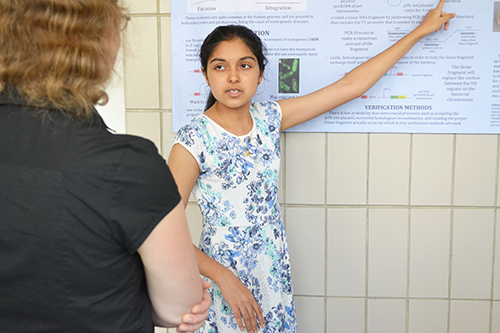
Neha Hebbar presents her research during Young Scholars' end-of-the-summer poster session in summer 2017.
Neha Hebbar, for example, currently a senior at Central High School, has been in Illinois’ Young Scholars program for the last two summers. “I really liked the session that I had two years ago when I first joined,” she reports. “It was a really new experience for me…doing research and working, interacting with graduate students and postdocs, and I really liked that experience. So I decided to continue it this year.” Her first summer, she was in the Physics program (Physics and POETS jointly run Illinois’ Young Scholars Program). However, this past summer, she joined POETS’ program “because I want to do more engineering based, ‘cause that's what I knew I wanted to go into in college,” she explains.
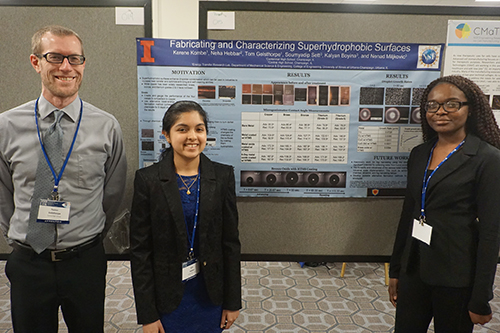
Tom Gestlethorpe, Neha Hebbar, and Kerene Kombe by their poster at the ERN in spring 2019. (Image courtesy of Joe Muskin.)
In summer of 2018, Hebbar worked in Nenad Miljkovic’s Energy Transport Research Lab in MechSE, fabricating superhydrophobic surfaces then testing them out. She particularly enjoyed having another high school student, Kerene Kombe, and a high school teacher, Tom Gestlethorpe, with her in the lab. “So that was a really nice experience,” she says. “I think that worked out really well—that dynamic.”
Hebbar shares that the most challenging thing about her whole experience was probably during the first few days and weeks, “trying to understand what research is going on here and reading through the scientific articles and trying to make sense of what our project is going to be. I think that was probably the most difficult.”
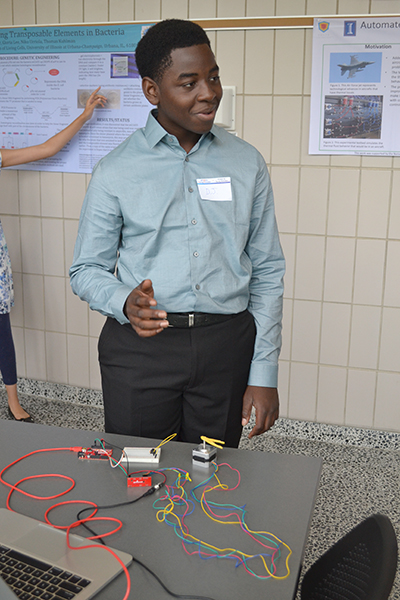
Darius Jackson explains about his project during POETS' Young Scholars poster session during summer 2017..
For Darius Jackson, a junior at Centennial High, last summer was also his second summer in the program. The first summer he was in the lab of POETS PI Andrew Alleyne. The second summer he worked with Andy Yoon in Kiruba Haran’s lab. In fact, he enjoyed that experience so much that he actually continued working with them on the project throughout the school year. Not only that, Jackson loves research so much that he’ll actually be participating for his third summer in a row in yet another lab during summer 2019.
Jackson’s research last summer and throughout the academic year was about building a drone—one that was “very fuel efficient, but also that worked very well,” he explains. But while the summer experience was good, he claims that his work during the school year actually ended up being the most productive, because that’s when they got their breakthroughs.
So while he’s learned a great deal and gained so much experience doing summer research, he agrees that six weeks is too short a period of time in terms of research. Plus, the first few days are taken up with students learning lab and safety protocols. “So the majority of the time,” he admits, “not a lot of us finish it,” he adds, referring to actually coming up with findings for their research. So actually, doing research several summers and/or during the academic year the way he did really makes sense.
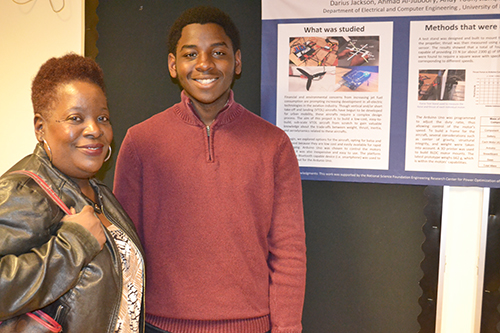
Darius Jackson's mom (left) on hand to watch her son Darius present his research to the Champaign School Board.
Like Hebbar, Jackson indicates that one of the most challenging things was “learning new things, but keeping up with the tide, I guess.” Not only was he trying to learn the new things he and his research team were discovering while doing research, but he was also trying to catch up to learn the things his labmates already knew knew. “Well also trying to keep up with them in the work and do it with them.” And Darius indicates that he’s learned a lot through his experience— definitely a lot about the subject matter, but also about “research, college life, and physics in general.”
The other key benefit the three gained from Young Scholars, along with conducting research, was to hone their presentation skills, which involved writing up their results, creating a poster with the help of their mentors, then presenting the results of their research in a number of venues. For instance, participants got their first taste of what presenting is like during the Young Scholars’ end-of-the-summer poster session.
Next up was presenting at the ERN (The Emerging Researchers National Conference in Science, Technology, Engineering and Mathematics [STEM]) from February 21–23, 2019 in Washington, DC. ERN was hosted by the American Association for the Advancement of Science (AAAS) and NSF’s Education and Human Resources Programs (EHR) and Division of Human Resource Development (HRD). The three scholars submitted abstracts of their posters which were accepted for presentation as a part of Young Scholars’ REM grant.
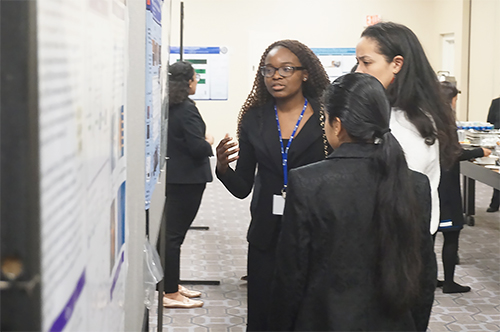
Kerene Kombe (center) discusses her research at ERN. (Image courtesy of Joe Muskin)
Regarding presenting at a national conference, Hebbar claims, “So we just treated it as a learning experience, because it was the first national conference that we've gone to. Yeah, it was a good experience.” Was she a bit nervous presenting at a national conference for the first time? "Definitely, a little bit," Hebbar acknowledges, but got more comfortable once she got into the situation, seeing all the other students doing it too.
In May 2019, Hebbar and Jackson also got one final chance to present their research—to the Champaign School Board. The two have Joe Muskin, POETS’ Educational Coordinator, to thank for the opportunity; he contacted them and asked if them if they wanted to participate. Hebbar told Joe, “Yeah, sure. Why not teach someone else about my research?”
What kind of impact has being involved with research via Young Scholars had on the high schoolers' future career plans? Hebbar indicates that it's significantly impacted them: “Well, it really solidified that I want to go into undergraduate research when I go into college, and continue this process, and have my own project, and try to do research with that.” She also hopes to mentor other students down the road. “Also maybe in the future, be one of the mentors instead of the students. This time just to see how I could teach someone else about my research.”
Plus, it’s helped Hebbar zero in on exactly what field she wants to pursue. While she enjoyed the experience in Mechanical Engineering, she’s decided that she wants to go into Bioengineering, which she says is “ a slightly different area, but still having to do with engineering and building things.”
Jackson has also figured out what field he wants to go into. What does he want to be when he grows up? A particle physicist. The research he did his first year was somewhat related to particle physics, it was about gasoline and the particles inside it. His 2018 research was not so closely related, but says it "still helped with fundamentals.” This summer may be more closely related. "I've heard just a little bit of what I'm doing, and it kind of sounds like it's around that area. So I'm really excited about it."
Where does he hope to study particle physics? At Illinois. While he hasn’t started applying to colleges yet, he reports, “But I really want to go to the U of I.” Which makes sense. It’s one of the best schools there is; he knows his way around; he knows a lot of key people; and he probably would be welcomed with open arms into any of the research labs he’s worked in.
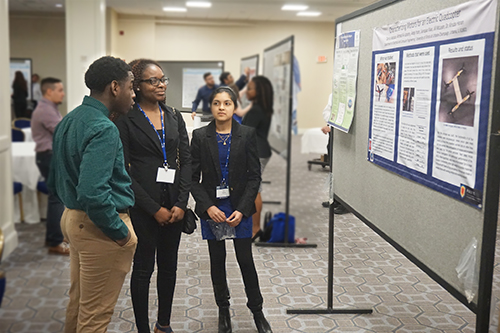
Darius Jackson, Kerene Kombe, and Neha Hebbar at ERN. (Image courtesy of Joe Muskin)
The takeaways that students gained from the whole YS process ranged from the research itself, to presenting at different events. In addition to knowledge about the areas they were researching, benefits they’d gained ranged from new skills to character growth, to paradigm shifts. For instance, Hebbar reports that the main benefit that she personally gained was probably “how to communicate with others and how to present her research in such a way that others understand. I think that's probably the biggest.”
Darius says he learned perseverance. “I've learned just to keep working, honestly, and not to give up, even though if something may not work out the first time; the second time; or, honestly, the third time; just keep going with it. It's just a lot of perseverance is needed for this program. But also it's like I was taught perseverance through here.” He also discovered that that pretty much describes research too. “The entire research process is just really testing—like a trial and error.”
From presenting during the various opportunities they’ve had, including the national conference and before the school board, Jackson has also come to realize that there are a lot of people who are on his side. “I learned people are very invested in what I'm doing, and not just myself, but young people in general. They're very invested in what we're doing and how we're learning. Just different things like that. People are very interested in the next generation."
Story by Elizabeth Innes, Communications Specialist. Images by Elizabeth Innes unless otherwise noted.
For additional articles about POETS, see:
- Local 8th Graders Build Solar Cars Courtesy of new POETS' RET Curriculum
- POETS Seeks to Change the Attitudes, Shape of Students in the STEM Pipeline
- POETS, New NSF Center at Illinois, Poised to Revolutionize Electro-Thermal Systems
- POETS website
More: POETS, High School Research , 2019
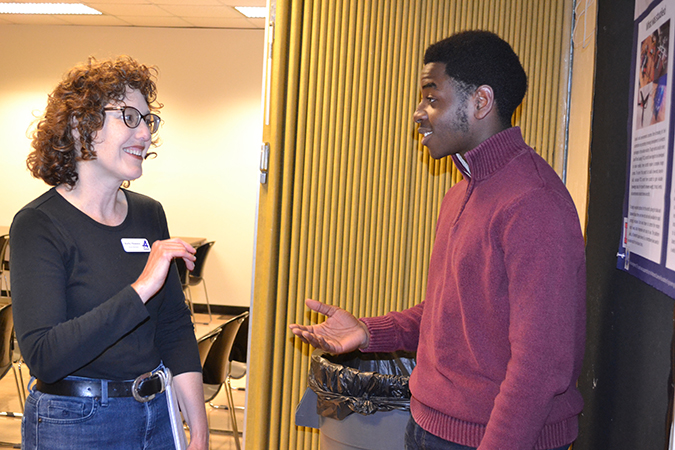 Darius Jackson chats with a member of the Champaign School Board.
Darius Jackson chats with a member of the Champaign School Board.